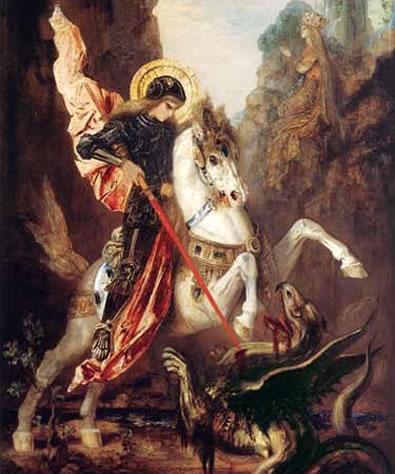 |
| Saint George (://www.jupitercreative.co.uk) |
Saint George was a Roman soldier under the Emperor Diocletian. Most of our records of his life is a mix of reality and legend. The first records that reference him date to the fifth century when churches were being named in his honor.
Saint George was born between 275 and 281 A.D. His father's name was Geronzio and was a famous Roman soldier from Cappodocia and his mother was from Palestine. They were both Christians. He was named George because it means "Worker of the Land"
When George was 20 years old, he traveled to Nicomedeia to present himself to the Emperor Diocletian to be a soldier. Diocletian knew his father and welcomed young George into the ranks of the Roman army. By his late twenties he was a guard to the Emperor himself.
Diocletian issued and Edict in 302 that proclaimed that every soldier in the Roman Army must offer a sacrifice to the Roman Gods. George supposedly tore up the edict in the middle of Nicomedeia. He openly professed his Christianity and denounced the Emperor. After refusing to convert he was tortured and executed on April 23 303 A.D.
 |
| Saint George on the British Half Soverign (http://www.royalmint.com/RoyalMint/web/site/PackedSets/SVH06.asp?orderby=&pg=&thumb=2) |
The most famous myth involving Saint George is his conflict with a dragon. The first versions of this myth was recorded after soldiers returned from the crusade. According to the myth, a dragon had made its nest in a spring near a town in modern day Lybia. The citizens need to offer a sacrifice to the dragon in order to get water from the spring, usually a sheep, or if on can't be found, a young maiden. One of the times where a maiden is chosen, the princes is decided by casting lots. As she is about to be eaten by the dragon, Saint George appears and slays the dragon. The citizens of the town renounce their paganism and accept Christianity.
Page created on 11/27/2008 12:00:00 AM
Last edited 11/27/2008 12:00:00 AM
Brooks, E.W.. Acts of Saint George. Gorgias Press, 1925.
Loomis, C. Grant. White Magic, An Introduction to the Folklore of Christian Legend. 1948.
